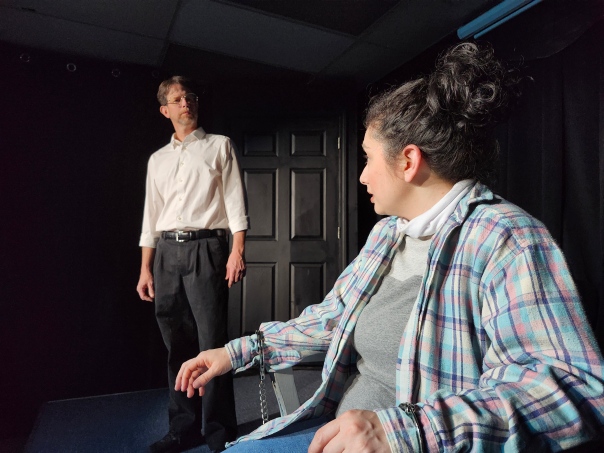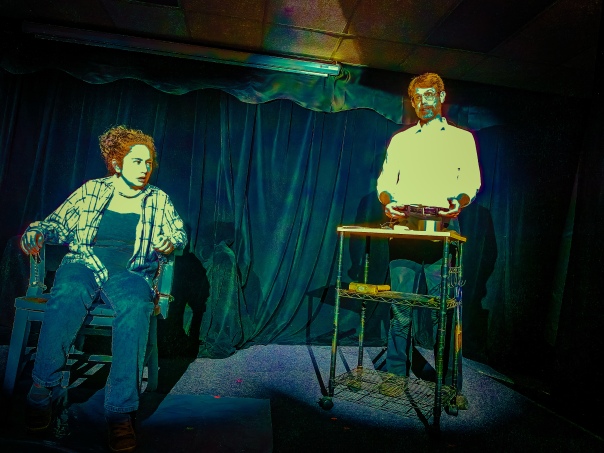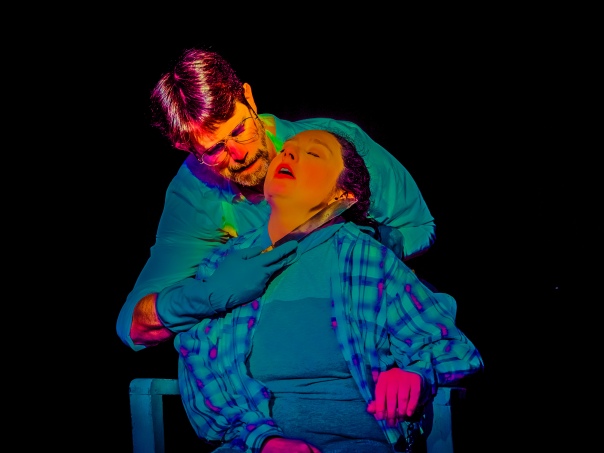Review: Catch the Butcher with Post Mortem Players @ CATCh
By Perry Tannenbaum

Serial killers, wherever they prey on young defenseless women and girls, are universally detested, even by fellow criminals. Yet these monsters, vying with vampires in wickedness and cunning, surely have a captive audience that greatly outnumbers their victims. Identify one and he’s frontpage news, sure to draw breathless airtime on local and national TV. Invent one who is truly special and you may spawn a bestseller and even an Oscar winner.
Yes, the guilty pleasures of sopping up the gory conquests of killers at-large and thrilling in the hunt to stop and avenge their rampages are perverse addictions shared by millions. Our susceptibility to the lurid scent of butchery was more than enough license for playwright Adam Seidel to bring us Nancy, his sacrificial lamb in the grimly satirical Catch the Butcher.
Nancy doubles down on the audience’s unspoken perversion: she wants to be abducted by “the butcher of Harbor Park.” Night after night, she sits alone on a park bench deep in the darkness of that dreaded landmark, fearing that she will be stalked and longing for it. As directed by Heather Wilson-Bowlby in the current Post Mortem Players production at CATCh, the company’s first sally into the QC, Nancy is almost advertising her yearning.
She’s reading The Stranger Beside Me, Ann Rule’s account of her friendship with serial killer Ted Bundy, a classic in the true crime genre. Heather-Bowlby’s mischievous touch, we will learn, is especially apt because the Harbor Park butcher dabbles a little in literature, dedicating a poem to each of his victims. Nancy’s fandom runs deep, admiring the fiend’s verse and feeling an unspoken kinship.
Parallel to this literary thread, the action of the early scenes is dark, silent, and animal until the Butcher pulls off his abduction. The silence of this lamb, as her killer circles ever more closely around her, is not merely evocative of a silent movie creepshow, begging for organ music in the background. We come to realize that it was also like a National Geographic documentary depicting a mating ritual in the wild.

Throughout Nancy’s bizarre captivity, Seidel has his fun juxtaposing the sophisticated with the primal and the drudgery of domesticity with our natural savagery – to shocking or comical effect. Numerous twists are in store as this butcher-victim pas-de-deux develops, including at least one complete flip-flop. And why not, seeing that Nancy and the butcher of Harbor Park were actually stalking each other?
If you don’t scan the QR code on Post Mortem’s flyer before the lights go down, gaining access to the full digital “Slaybill,” you won’t have any idea of where the silent opening scenes are happening, who we’re watching, or when the action takes place. That heightens our suspense and delays the onset of humor we’d expect at CATCh (Comedy Arts Theater of Charlotte). You’ll know most of the details if you’ve read the script beforehand, but Wilson-Bowlby flouts the playwright’s insistence that we’re in the present day, giving her star headphones instead of earbuds and a boombox instead of an iPhone.
We’re no further back than 1980, when The Stranger Beside Me was first published, but the copy that Jackie Obando Carter is clutching shows considerable wear and age. Costume designs by Carter were no more decisive to my eyes in designating the decade. More impressive were the design and execution of special effects that Carter and Hilary Powell collaborated on: one stabbing was particularly impressive since, at CATCh, my wife Sue and I were seated as close to the action as we would be watching a card trick.

Carter’s chemistry with her abductor, Chuck Riordan as the Butcher, is deliciously volatile. The vibe is more spiced with sensuality on Carter’s end as Nancy tries to divert and charm Bill – revealing his name bares the first chink in the Butcher’s armor – as her survival instincts kick in. While Nancy is dazed and disoriented when she first awakens in the Butcher’s soundproofed dungeon, this is what she quested for during her previous vigils in the dark.
She is not like us. She needs prodding to scream her loudest and confirm Bill’s soundproofing. A knife at her throat as she sits helplessly handcuffed to a chair? Carter must calibrate the mortal terror that Nancy is experiencing with her fantasy fulfillment and delight. The more we realize how diligently Nancy has worked to be here, the more we appreciate the complexity of Carter’s performance.
Since she candidly lets out that the Butcher and his technique aren’t what she expected, Bill is also a bit disoriented as he realizes what he has stepped into. Being measured against the glamor and terror of Nancy’s dream serial killer begins to tilt his attitude toward defensiveness and appreciation. While maintaining his dominator role, he finds he must prove himself as a ruthless butcher and sustain the admiration his victim has professed toward his poetry.
Riordan, like Carter, is making his QC debut in a role that requires deft and sudden navigation. But he has significantly more leeway in how he portrays this monster as his vulnerabilities are exposed. He doesn’t get to be quite so sure of himself as the adventurous nothing-to-lose Nancy – deviations from glamor, savoir faire, and fearsome menace all redound in his favor as we see more beneath his façade. He’s an anti-villain, in a sense.
Riordon can thus roll with the moment and seem authentic so long as he doesn’t fumble his lines or visibly stumble in his actions. Especially in Bill’s domesticated scenes, Riordon can mute his paranoia and be altogether humdrum. There are key moments when Riordon is suddenly called upon to show a killer’s steel or a lover’s grace. He masters these with aplomb, and he’s strong on Bill’s telling trait: he wants to make his mark with his murders and his poetry, desperate for both notoriety and acclaim.
It would be heartless to give an even sketchy summary of how the story unfolds with Seidel’s unfailing logic. So let’s concentrate on a sequence that was pivotal for me.
To gain precious time, Nancy has convinced Bill that she wishes to hear the poem that was written about her. Bill not only picks up on the ploy, he notices that, compared with previous victims, Nancy isn’t as terrified when a knife is at her throat. She is not what he expected. He must consider the possibility that Nancy is a cop or an FBI agent, particularly after she escapes her handcuffs to use the toilet.
Fast forward a bit past some juicy action, one of them with French toast, and Bill has finished his new poem. We haven’t sampled the Butcher’s literary craft before, so we presumably know less about what we can expect than Nancy. “A Single Rose,” as Bill titles it, is recognizably dreadful – so dreadful that I initially suspected that the serial killer was laying a fiendish trap for our lady in distress, testing whether her esteem was worth having.
Asked for her reaction, Nancy comes back with an utterly hilarious, magnificently audacious response: “It’s not your best work.”
At this point, we had reached a realm of dark humor that was unfamiliar to me. In perfect style. From here, Seidel could take us wherever he wished – even upstairs, out of the Butcher’s dungeon, to a new household.
In the aftermath, we get to know the couple’s next-door neighbor, Joanne – a bubbling busybody portrayed by Jennifer Briere, yet another talented Post Mortem newcomer. She enters through the front door with a bundt cake, then a vase filled with freshly cut roses, seemingly well-acquainted with the welcoming-new-neighbors drill. Briere is especially precious when Joanne learns how Milwaukee, wherever that is, differs from Texas. You will see that all the audacity Nancy has shown us before is eclipsed the moment she dares to open the front door for Joanne, defying Bill’s stern commandment.
Reviews of Catching the Butcher sometimes cite Silence of the Lambs as an inspiration and inevitably Dexter, because the original Nancy in the 2015 Off-Broadway production, Lauren Luna Vélez, was a fixture in that series. If you’ll permit a more classical viewpoint, Seidel’s macabre comedy reminded me more of John Fowles’ The Collector, may favorite horror novel alongside Dracula. Bill is more of a scientist than Hannibal, less of a gourmand.

The household idyll we see blossoming after intermission, with its undercurrent of doom, took me back to prelapsarian Adam and Eve, with snoopy vivacious Joanne subtly installed as our Serpent. Wilson-Bowlby may have been feeling similar vibes as she staged the ending, giving it more of a wedding or honeymoon tang than Seidel could have imagined. Quite wonderful.
